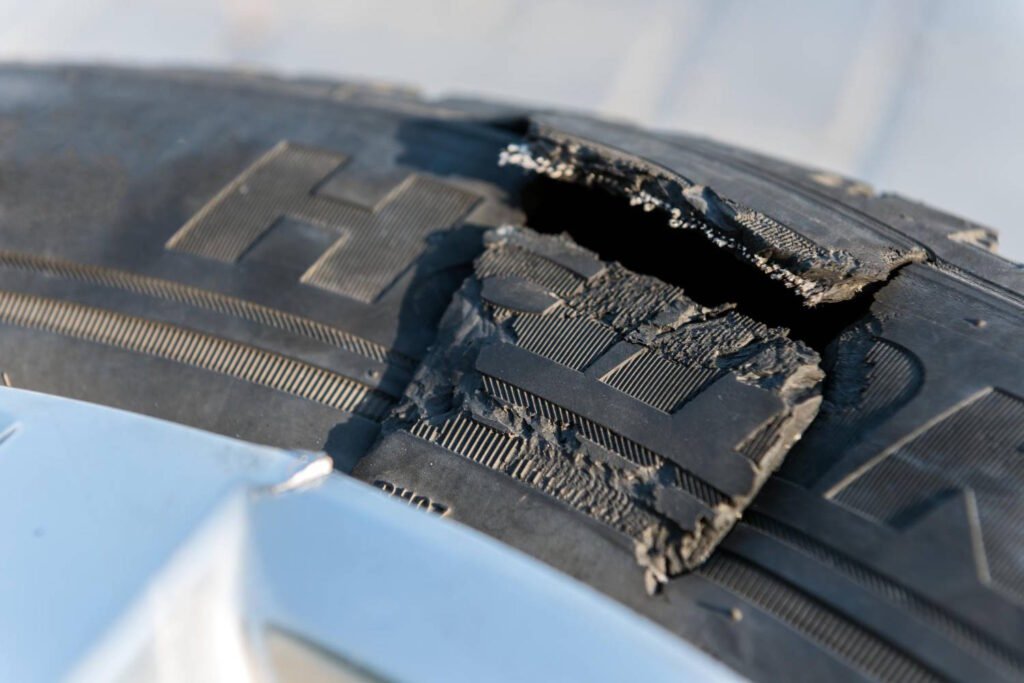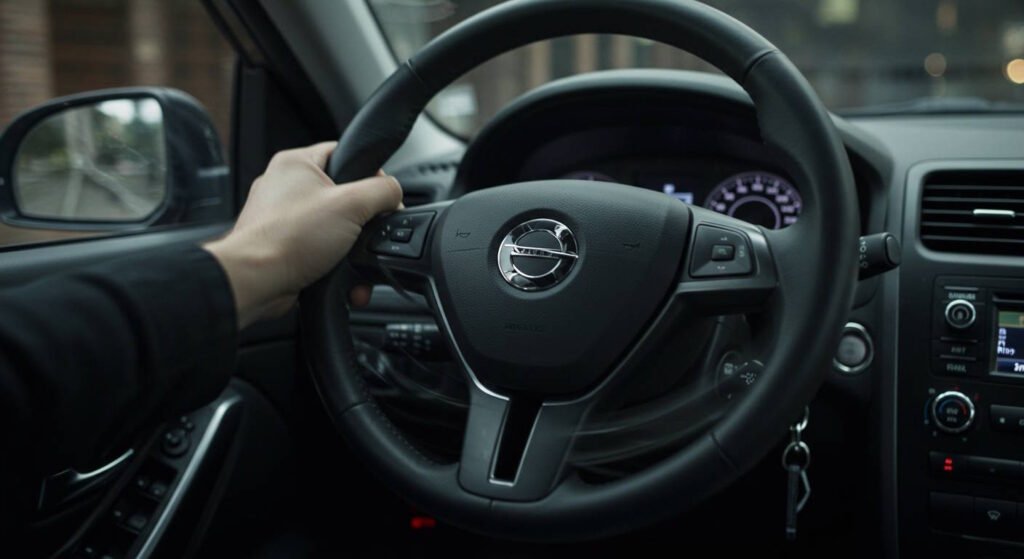Have you ever felt your steering wheel shake when driving fast on the highway? It’s not just an annoying sensation, it could be your car’s way of warning you about a problem that needs attention. Steering wheel vibrations are often related to issues with your tires, wheels, suspension, or brakes. While the vehicle may still feel drivable, ignoring the symptoms can lead to bigger, more expensive problems down the line.
This article will walk you through what causes the steering wheel to shake at high speed, along with what each issue means and how it can typically be fixed.
Signs Of Unbalanced Tires

One of the most frequent causes of a vibrating steering wheel is unbalanced tires. Among the common symptoms of unbalanced tires is noticeable shaking in the steering wheel, especially at higher speeds. When a tire is not evenly balanced, its weight distribution is uneven as it spins, typically causing vibrations that begin around 60 to 70 miles per hour.
Tires can become unbalanced after a new installation, seasonal temperature changes, or simply from regular wear. Balancing the tires is a quick fix performed at any standard tire shop. During the process, technicians add small weights to the rim to ensure each tire spins evenly and smoothly.
Wheel Alignment Problems Causes

Misaligned wheels can also cause your steering wheel to shake. This often happens after hitting potholes, driving over curbs, or going over speed bumps too quickly. When the wheels are not properly aligned, they don’t point in the same direction, which can lead to uneven contact with the road and unwanted vibrations.
Signs of misalignment may also include uneven tire wear and the car pulling to one side while driving. An alignment service adjusts the angles of the wheels to make sure they meet the road evenly and point straight ahead. If you are a Honda vehicle owner, it might be rare, but if you are facing issues like the FCW system failing on a Honda Accord, you need this guide.
Tire Sidewall Damage or Wear

Worn-out or damaged tires can contribute to steering wheel vibrations. Look for signs like uneven tread wear, flat spots, bulges, or bubbles in the sidewall tire damage. These issues prevent the tires from rolling smoothly, which can lead to noticeable shaking—especially at highway speeds.
It’s a good idea to inspect your tires regularly and replace them when the tread gets too low or if you see any damage. Maintaining proper tire pressure also helps reduce uneven wear and improves overall driving comfort.
Warped Brake Rotors

If your steering wheel shakes primarily when you press the brakes, the most likely cause is warped brake rotor symptoms. Brake rotors are flat metal discs that your brake pads press against to stop your car. Over time, heat from braking can cause these rotors to warp, especially if the brake pads are not replaced when needed.
Warped rotors create an uneven surface, which leads to vibrations when the brakes are applied. If caught early, rotors can sometimes be resurfaced. In more advanced cases, they may need to be replaced entirely.
Sticking Brake Calipers

Although less common, sticking brake calipers can also cause the steering wheel to shake. Brake calipers hold the brake pads and push them against the rotors when you brake. If a caliper becomes stuck due to debris, corrosion, or a mechanical failure, it may stay partially engaged while driving.
This results in uneven braking pressure and causes the vehicle to pull or shake, even when you’re not braking. Sticking calipers usually require professional repair or replacement.
Worn Suspension Components

Your suspension system connects the car to its wheels and is designed to absorb bumps and maintain control. It includes parts like shocks, struts, control arms, bushings, and tie rods. If any of these parts are loose, worn, or broken, the car may not stay stable at high speeds, leading to vibrations felt in the steering wheel.
Suspension issues may also cause clunking noises or an unstable feeling when turning or driving over uneven surfaces. Diagnosing and repairing these problems usually requires an inspection by a qualified mechanic.
Bent Wheels or Rims

Driving over a pothole or hitting a curb can bend a wheel rim. Even a small bend can throw off the balance of the wheel and create vibrations, especially at high speeds. Bent rims can often be repaired, but in some cases, they need to be replaced.
Visual inspection might not always reveal the damage, so if you’ve recently hit something hard and the wheel started shaking afterward, this could be the cause.
Worn Engine or Transmission Mounts

Though less common, worn engine or transmission mounts can cause vibrations that are felt through the steering wheel. These mounts hold the engine and transmission in place and absorb movement and vibrations from the drivetrain. When they wear out, the engine may shift more than it should, creating a noticeable shake while accelerating or driving at steady speeds.
This issue is more common in older vehicles and requires professional diagnosis and repair. Did you know Honda Recalls 295k Vehicles Due To Engine Stall Risk?
Wheel Bearings

Wheel bearings allow your wheels to spin freely and with minimal friction. If a bearing is worn or damaged, it can create a humming noise, uneven tire wear, and eventually vibration—especially while turning. Bad wheel bearings should be replaced as soon as possible to avoid more serious problems, including wheel failure.
Driveshaft or Axle Issues

If your vehicle has rear- or all-wheel drive, a problem with the driveshaft or axles could be the source of vibration. A bent driveshaft or worn-out CV joint can cause shaking that increases with speed. This is a more complex issue and typically needs a mechanic’s attention.
Is It Safe to Drive With a Shaking Steering Wheel?
In most cases, your car can still be driven if the steering wheel is shaking, but it’s not recommended to ignore the issue. Vibrations often indicate a problem that, if left unaddressed, can lead to more serious damage or make your car less safe to drive.
If the shaking is getting worse, happens suddenly, or is accompanied by other symptoms like noise, pulling, or braking issues, it’s best to have your vehicle inspected as soon as possible.
What Can You Check at Home?
While some problems require a professional mechanic, there are a few things you can check on your own. Look at your tires to see if there are any signs of damage or uneven wear. Make sure your tire pressure is at the recommended level. Also, note when the shaking occurs—does it happen only at high speeds, only when braking, or all the time? This can help narrow down the cause.
Final Thoughts
A shaking steering wheel might start as a small inconvenience, but it often points to a bigger issue that needs attention. From tire balance to brake problems or suspension wear, the causes can vary—but most are fixable if caught early. Keeping up with regular maintenance and acting quickly when you notice new symptoms is the best way to keep your vehicle running smoothly and safely.
While our blog doesn’t offer repair services, we’re here to help you understand what might be going wrong with your vehicle so you can make informed decisions and stay safe on the road.
FAQs
❓ Is it Safe to Drive with a Shaking Steering Wheel?
Technically, yes—but it’s not recommended.
While your car may still seem drivable with a shaking steering wheel, the vibration is usually a sign of an underlying issue—often related to tires, brakes, suspension, or steering components. Ignoring it can lead to:
-
Worsening damage to suspension parts
-
Brake system failure (if rotors or calipers are the cause)
-
Reduced steering control at high speeds
-
Increased tire wear or even tire blowouts
👉 Bottom line: Driving with a shaking steering wheel may be safe for a short trip, but it’s best to have your vehicle inspected as soon as possible to avoid safety risks and costly repairs.
❓ Why Does My Steering Wheel Shake at 60 or 70 MPH?
If your steering wheel starts shaking specifically between 60 and 70 mph, the most likely culprit is wheel imbalance. Here’s why:
-
At lower speeds, the imbalance isn’t strong enough to be noticeable.
-
Around 60–70 mph, the centrifugal force increases, making even small imbalances in tire weight distribution cause noticeable vibration.
-
Past that speed, the vibration might lessen temporarily—but that doesn’t mean the issue has disappeared.
Other possible causes at these speeds include:
-
Tire defects (flat spots, uneven tread, bulges)
-
Bent wheels or rims from potholes or curbs
-
Worn suspension parts that affect stability
👉 Fixing this often involves a simple tire balancing service, but a full check of alignment, wheel condition, and suspension may be necessary if the shaking persists. Check our guide on properly jump-starting a car.



